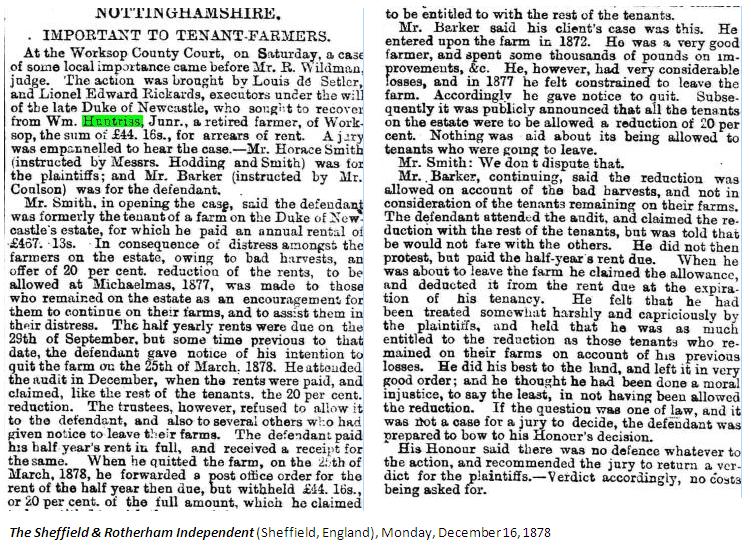William and Charlotte Huntriss
On the face of it, William Huntriss (1849-1912) and his wife Charlotte had everything going for them. William was the eldest surviving son of William Huntriss of Halifax, and inherited a fortune on the death of his father. Prior to that William was a farmer; after his father died he lived on his own means in a succession of grand houses, and watched his three sons growing up. By the time of the 1911 census, the boys were no longer living at home, which was then at Mattersey Hall in Nottinghamshire. Life was good for the Huntriss family.

William was born in 1849, and was educated at Leeds Grammar School.

His father William was a well-to-do mill-owner in Halifax, and you would expect that one or more of his sons would follow him into his business. This was not the case; sons Edward and Harold were to become solicitors, whilst William and Charles became farmers. The 1871 census shows William as a “Farm pupil” staying with George and Lucy Eddison at Gateford near Worksop.

The Eddisons were Quakers from the start of the movement in the seventeenth century. The family had established itself in Gateford around 1720, having been in the cloth business in Leeds. At Gateford, as well as continuing in business, they were successful and innovative farmers. They were part of the close community of Quakers involved in key moments of the Industrial Revolution. The family had connections with the invention of the steam plough, anti-slavery protests, legal battles to save children from sweeping chimneys and the birth of the railways when money poured into Quaker banks.
In 1872, William was running his own farm (Morton Hill) on the Duke of Newcastle’s estate. Whilst he had invested a considerable amount in improving the farm, this period coincided with the Great Depression of British Agriculture, which occurred during the late nineteenth century and is usually dated from 1873 to 1896. The depression was caused by the dramatic fall in grain prices following the opening up of the American prairies to cultivation in the 1870s and the advent of cheap transportation with the rise of steamships. British agriculture did not recover from this depression until after the Second World War.
William gave notice in March 1878 to quit the farm, and became involved in a legal dispute over rent arrears.

By 1881, William, together with his sister Ellen, was living at “The Birks” in Whitwell. William (still described as a farmer) married Charlotte Gyles in 1883;
Ellen was married to John Caw the following year.
In 1886, William was a guest at the festivities to mark the coming of age of the 7th Duke of Newcastle at Clumber House

By 1891, William and Charlotte had started their family, and had moved to Markham Hall.

In the census, William was described as “living on his own means”, presumably having inherited a fortune from his father who died in 1883. His eldest son William, born in Whitwell, was 4, whilst Harold, born at Markham, was just 1.
Ten years later, William and Charlotte had moved again, this time to Highfield house in Lound. However there is no mention of their three sons. William was at school in Penrith in Cumberland; Harold and Cyril were both at Uppingham School.

The 1911 census showed yet another move – this time William and Charlotte were at Mattersey Hall. At that time, William was living on his own in Halifax, practising as a solicitor; Harold joined the army and was a second Lieutenant in the Bedfordshire Regiment stationed at Maida Barracks in Aldershot, whilst Cyril was still at Uppingham School.

William died suddenly in November 1912

Charlotte Huntriss moved from Mattersey; in 1914 she was living in Scarborough, probably at “Springfield”. It is somewhat ironic that Scarborough was subject to a bombardment from the German fleet whilst Edward was staying there with his mother whilst on sick leave as he recovered from being shot in the thigh by a German sniper.
However the war began to take its toll . . .
Click on the images for further details



Mattersey Church contains a moving memorial to the three sons



Charlotte maintained contact with the Huntriss family – the following letter was written to her nephew John, who had emigrated to North America.
Click on the image to see the full letter


The images of the page from the family bible, and the pictures of William and Charlotte were kindly provided by Richard Morton, a descendant of the Gyles family.





